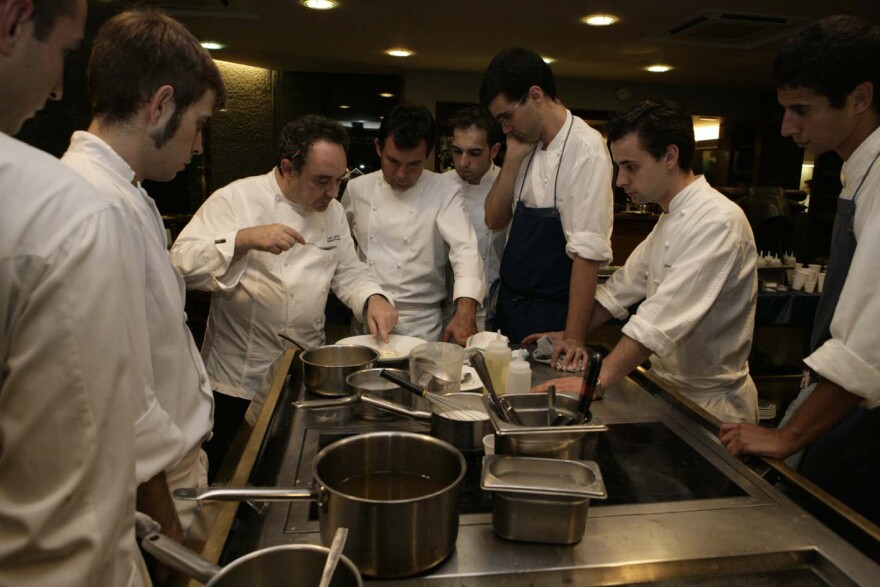The man once hailed as the "Salvador Dali of the kitchen" is getting his own art exhibit.
Ferran Adrià might not be a household name, but for nearly three decades, as chef and mastermind of the acclaimed Catalan Spanish restaurant El Bulli, he moussed, foamed and otherwise re-imagined cuisine in modernist ways that have inspired many of the world's top chefs.
Hailed as the world's best restaurant, El Bulli closed in 2011. But a new exhibit that opened Friday at London's Somerset House offers food aficionados a chance to peek inside the mind of a man hailed for his culinary creativity.
"Probably no other chef has the name value, reputation or substance to sustain this kind of exhibit," Claire Catterall, director of exhibitions at Somerset House, tells The Salt. "Ferran is unique, because he's really changed cooking in a way no other chef has; and so many of the world's chefs have studied at El Bulli, so it is really where it all starts."

"El Bulli: Ferran Adrià and The Art of Food" covers two floors of the arts and culture space. It starts with a history of El Bulli, charting its evolution from a mini-golf course owned by a German couple who kept French bulldogs they affectionately called "bullis," to a beach bar, and later a grill room restaurant. By 1980, it had become one of the best restaurants on the Iberian Peninsula. Adrià arrived four years later and took over the kitchen completely in 1987, earning it three Michelin stars, a reputation for innovation, and the respect of the food world.
Throughout his career at El Bulli, Adrià kept extensive records. Display cases show correspondence, historical photographs, and a replica of a box of 17 different kinds of elaborately produced chocolate bonbons served at the end of each multi-course, $325 meal at El Bulli.

Upstairs, elaborate clay models show dishes in the development phase, as well as "before" and "after" drawings, revealing the meticulous way Adrià and his team worked. The highlight is a wall of small video monitors, visual demonstrations of El Bulli's inventive recipes, heavy on foams, creams, aerated ingredients and other innovative approaches to gastronomy.

Many have previously called Adrià an artist, but for a chef and restaurant to be the subject of an entire exhibit is a first. While Somerset House hasn't come under fire from art critics, Catterall confesses this exhibit, much like Adrià's style, is highly experimental.
"I have heard everyone's watching it very intently to see what's in it," she says, "but also whether people will come. ... We're quietly hopeful."
Adrià says there's reason for optimism. "Cuisine is a language that everyone understands," he tells The Salt.
The exhibit offers a small preview of the museum he's creating at the El Bulli Foundation in Spain, set to open in 2015, where there will be professional cooking workshops, as well as special dinners to benefit charities and the foundation. There are even plans for Bullipedia, a cooking Wikipedia of sorts for chefs and the public.
"My dream is that in 150 years, the El Bulli Foundation is still here to help with creativity and inspire chefs," Adrià says.

In an age when it's rare to go to a restaurant without seeing someone snap a photo of food, it's hard to imagine the legacy of El Bulli dying anytime soon. Catterall says the relatively recent pop culture trend has made "food as art" acceptable. She hopes it will encourage people to talk even more about food.
"People have become a lot more sophisticated in their knowledge of food, a lot more interested in food, and that certainly didn't exist 10 years ago," she says. "People love their restaurants, going out to eat, but they haven't appreciated it in this way."
Somerset House will host "El Bulli: Ferran Adrià and The Art of Food" through Sept. 29, 2013. The exhibit will also travel to Boston's Museum of Science, Moscow and other cities around the world.
Copyright 2021 NPR. To see more, visit https://www.npr.org.


